It’s important to take care of yourself as the world reopens. It’s easy to go from 0 to 100 when it comes to socializing, but after a year of reduced social contact you might need a little extra TLC. The many options for movie nights, concerts and dinners out shouldn’t be made at the expense of your sleep schedule. Safely enjoy socializing to your heart’s content, but also don’t forget to eat some vegetables, drink water and get your zzz’s.
We spoke with Shelby Harris, Psy.D., director of Behavioral Sleep Medicine at the Sleep-Wake Disorders Center, Montefiore Medical Center, to get the inside scoop on how to get a great night’s sleep.
According to the CDC, “Getting enough sleep is not a luxury—it is something people need for good health. Sleep disorders can also increase a person’s risk of health problems. However, these disorders can be diagnosed and treated, bringing relief to those who suffer from them.”
The CDC recommends that adults between the age of 18 and 60 get 7 or more hours per night.
The top sleep hacks for falling asleep faster and sleeping better:
- Put your phone away at least two hours before bedtime
- Utilize aromatherapy for soothing and relaxing scents
- Buy a weighted blanket
- Ensure you sleep in full darkness – if you can’t, buy a sleep mask
- Use a white noise machine or meditation podcast to block out noise
- Enjoy a light stretch or yoga flow to reduce tension and increase melatonin
- Reading before bed
- Avoid working out intensely right before bedtime
Put your phone down two hours before bed. You’ll thank us tomorrow, we promise.
“The blue light emitted by your cell phone screen restrains the production of melatonin, the hormone that controls your sleep-wake cycle,” says SCL Health. “This makes it even more difficult to fall asleep and wake up the next day. The circadian rhythm seems to be especially sensitive to blue light since it has a short wavelength.”
news and other imagery excite your brain and increase alertness, the light emitted from your phone is also going to delay your sleep and mess with your circadian rhythm.
“Most electronics emit blue light, which suppresses melatonin before bedtime,” explains Dr. Harris. “Melatonin is the ‘hormone of darkness’ and comes out in the evening to help induce sleepiness. When we are exposed to blue light within one to two hours before bedtime, we suppress melatonin and it becomes more difficult to fall asleep.”
Although you can still listen to music or audio books through your smartphone, Harris recommends turning the device over to ensure you’re not directly facing the snooze-killing blue light.
So if you’re looking to catch some zzz’s, put your phone away.
Bust out the aromatherapy. Breathe in and out the zen vibes.
Certain fragrances have a calming effect on your brain. This is caused because the nerves in your nasal cavity relay information to your brain. These nerves will either sound the alarm if something is bad, or increase the level of serotonin in your brain, depending on the smell. This reaction can help you feel relaxed before shutting your eyes.
But not all smells are created equal. Lavender is a popular scent, but you can also check out other relaxing smells such as ylang ylang or chamomile. AmeriSleep recommends the following oils: lavender, chamomile, sweet marjoram, bergamot, clary sage, valerian, sandalwood, ylang ylang, jasmine and peppermint.
Be cautious before you dive nose first into your aromatherapy kit. Some essential oils can cause allergic reactions, so please check with your doctor.
Use a weighted blanket. It’s like getting tucked in with a giant hug.
Weighted blankets were all the craze a few years ago, but they’re not just a trendy marketing push, they can be extremely helpful for anxiety and increasing sleep function. Most weighted blankets weigh between 5 and 30 pounds in order to mimic a technique called “deep pressure stimulation.”
Deep pressure stimulation is a form of therapy that helps regulate your central nervous system. Your central nervous system is the part of your body that controls all of your nerves. It’s responsible for everything that you feel. When you feel anxious, that’s your central nervous system.
Deep pressure stimulation uses pressure to calm the central nervous system and regulate its functions. This can be as simple as getting a hug – or using a weighted blanket. This reduces levels of anxiety and increase levels of serotonin, which will increase melatonin that helps you fall asleep.
Block out all light. Sleeping masks are equal parts fashionable and functional.
Your sleep cycle is naturally tied to light (see above, re: why you shouldn’t look at your phone). When you are exposed to bright light your body naturally thinks that it’s time to wake up and start the day. Therefore it’s best to sleep in as much darkness as possible.
But unfortunately if you live in a city with lots of light outside, or in the northern hemisphere during the summer, it can be hard to get the darkness you need. Enter a sleeping mask. They can be quite cute, but can also help you get that much needed sleep.
Try a white noise machine or sleep meditation to knock out in an instant.
Loud noises can interfere with your sleep. No one likes when their roommate starts playing the bongos at 2 a.m. And while your roommate might be very respectful, it’s likely that small noises (like getting up to get a drink of water in the middle of the night) might interfere with your sleep.
Skip the stress of an unwanted wake up call and invest in a noise machine. You can also use a simple phone app if full scale a noise machine isn’t in your budget.
Get in the nighttime flow with some restorative yoga.
Stretching and yoga is a great way to wind down before turning in for the night. In restorative yoga you hold gentle poses for several minutes at a time. The goal is to increase flexibility, not to challenge yourself.
This style of stretching helps reduce lactic acid within your muscles and naturally increases melatonin. Looking for yoga ideas? Check out our blog posts on gentle stretching and our free online yoga classes.
Save intense workouts for early in the day. The adrenaline rush won’t help you sleep.
Some people might think it’s a good idea to go on a vigorous run right before bedtime in order to tire yourself out. Sadly, they are mistaken. While running has many benefits, a run right before bed will increase your adrenaline. Adrenaline is a natural energy booster and will not aid in relaxing you before bed time.
Save the workout for the early morning or anytime prior to your nighttime routine. Instead opt for the yoga we mentioned earlier.
Reading before bed
You know that feeling: curling up in a cozy bed after a long day with a book in hand you’ve been looking forward to reading all day, and right before you crack open the cover, ding!, your phone loudly signals that your best friend just sent you a hilarious Snap or your mom posted a new video of your dog on Facebook or your favorite celeb made the cutest pregnancy announcement on Instagram. You’re soon looped into a hive mind of likes, shares and “awww’s.” An hour has slipped by and reading your book will now end in being too tired to wake up at the morning’s first alarm and leaving late for work.
Ugh.
While reading can take you into a whole new world of characters, scrolling through social can do something just as similar—and it’s real. But are you really gaining any knowledge or insight from this screened-in world you’re visiting? And couldn’t you gain more from the paperback in your same hand? It turns out, social media before bed can contribute to a lot more than just a lack of intellect.
Reading a book
Grabbing a novel and immersing yourself in a good story sounds so appealing, because your body actually labels it as a major stress-buster. Researchers found that reading can reduce stress by up to 68 percent no matter which type of book you read. It allows a person to escape into a world unlike their everyday and explore someone else’s thoughts and ideas.
Plus, creating this bedtime ritual of reading before turning out the lights sends a signal to your body that it’s time to wind down and fall asleep, according to research at Mayo Clinic. But here’s the caveat: It must be a real book, not an e-book. The screen on an e-reader, phone or tablet can keep you awake longer and even hurt your sleep. Refer to your bedtime stories as a child, and get sleepy with a real paperback.
So, do big executives and powerful leaders ease their mind by reading fiction? You might think they need to answer last-minute emails or turn toward novels with themes centered on growing business models, but research shows that many successful entrepreneurs read anything other than a subject related to their career. This allows them to foster more creativity and passion for their work projects by looking at problems, people and difficult situations in a different way.
In the digital age of sharing everything and anything, it can be difficult to think of living a life unplugged, but your brain may thank you if you do take a timeout. Concentration is quickly becoming a thing of the past when social media notifications, emails and meeting reminders are constantly flashing on our phones and computers.
However, reading before bedtime provides a time where we must concentrate and process only the information directly in front of us—something with pages we turn, words we digest and a story we piece together. Everything else going on can wait. Your book (not an e-book!) needs you now. Talk about a great bedtime story.
What to do when you can’t sleep
Do. Not. Force. It.
Some nights you hit the sheets, and you just know your snooze will be lackluster. Maybe you’re nervous about your interview tomorrow or are still simmering about the unresolved argument you had with your significant other. Or maybe, you stayed up a little too late watching Supernatural reruns on Netflix.
But other nights, the reason you’re tossing and turning until 1 a.m. isn’t so clear. You woke up, went to work or school, worked up a sweat in class, came home, and only had one glass of vino (okay, maybe two). With a few mild differences here and there, it was like any other day. So why the struggle with sleep on this particular night?
“The biggest issue is that we don’t have a good separation between day and night anymore. We live in a 24/7 society, with work or electronics seeping into our home life at night,” says Shelby Harris, Psy.D., director of Behavioral Sleep Medicine at the Sleep-Wake Disorders Center, Montefiore Medical Center. “Sleep is thought of being an on/off switch, but sadly, it doesn’t work that way.”
What’s worse, Dr. Harris says, a lack of sleep doesn’t just result in morning grogginess or baggy eyes—it can dramatically affect your eating habits and overall health..
“When we sleep less, we have an increase in ghrelin, the hormone that makes us hungry, and a decrease in leptin, which tells us we’re full. As a result, we eat more because we don’t have a strong signal to stop,” she says. “In addition, sub-par sleep can lead to increased work errors, poor concentration and attention, increased absenteeism, poor motor skills, worse memory, increased stress and depression/anxiety.”
But there is some good news, sleeping beauties: Getting a good night’s sleep is 100 percent attainable with the right preparation. Here, Dr. Harris lists eight surefire tips for ensuring the time between hitting the sheets and getting shut-eye is as minimal as possible.
Skip those dated wives tales
Although it’s not entirely clear where this old wives’ tale originated (or counting sheep, for that matter), Dr. Harris says that liquids of any kind should be avoided once you hit the bed. “Have a tiny sip of water to get any medication down, but that’s it.”
Do your best to get up at a decent hour on the weekends
While you may look forward to snoozing past noon on the weekends, according to Dr. Harris, it’s also a quick way to disrupt your sleep schedule for the week. “Sleeping in on the weekends can make it hard to adjust to a regular, earlier bedtime on Sunday evening,” she explains. “You’re essentially creating jet lag in your body Friday through Sunday morning.”
Trouble getting motivated in the weekend’s wee hours? Try picking an early Saturday or Sunday class to attend with a friend (so you’ll have no excuse to bail).
Make sure to exercise, but within a certain timeframe
Although it might be tempting to squeeze in a late-night sweat sesh after you’ve completed your chores for the day, Dr. Harris says it’s best to resist if you want a good night’s snooze. She recommends avoiding the gym within three hours of bed.
Of course, that doesn’t mean you still shouldn’t try to fit in a workout elsewhere. “Even 20 minutes of exercise four to six hours before bedtime can help you fall asleep faster.”
Resist the nap temptation
As heartbreaking as this piece of sleep advice sounds, according to Dr. Harris, it’s crucial if you’re finding yourself with too much energy in the late hours. “Avoid naps, especially if you have trouble sleeping,” she says. “Naps steal sleep from the night.”
Don’t force it
Just like that ill-fitting H&M dress that looked so much better on the hanger, when it comes to falling asleep at night, the best piece of advice is ultimately the simplest: Don’t force it.
“Don’t lay in bed if you can’t sleep,” says Dr. Harris. “Instead, get up after approximately 20 minutes (don’t watch the clock, just estimate) and do something quiet, calm and relaxing in dim light until you’re sleepy. Don’t try to force sleep to happen. The more you worry about it, the worse it will get.”

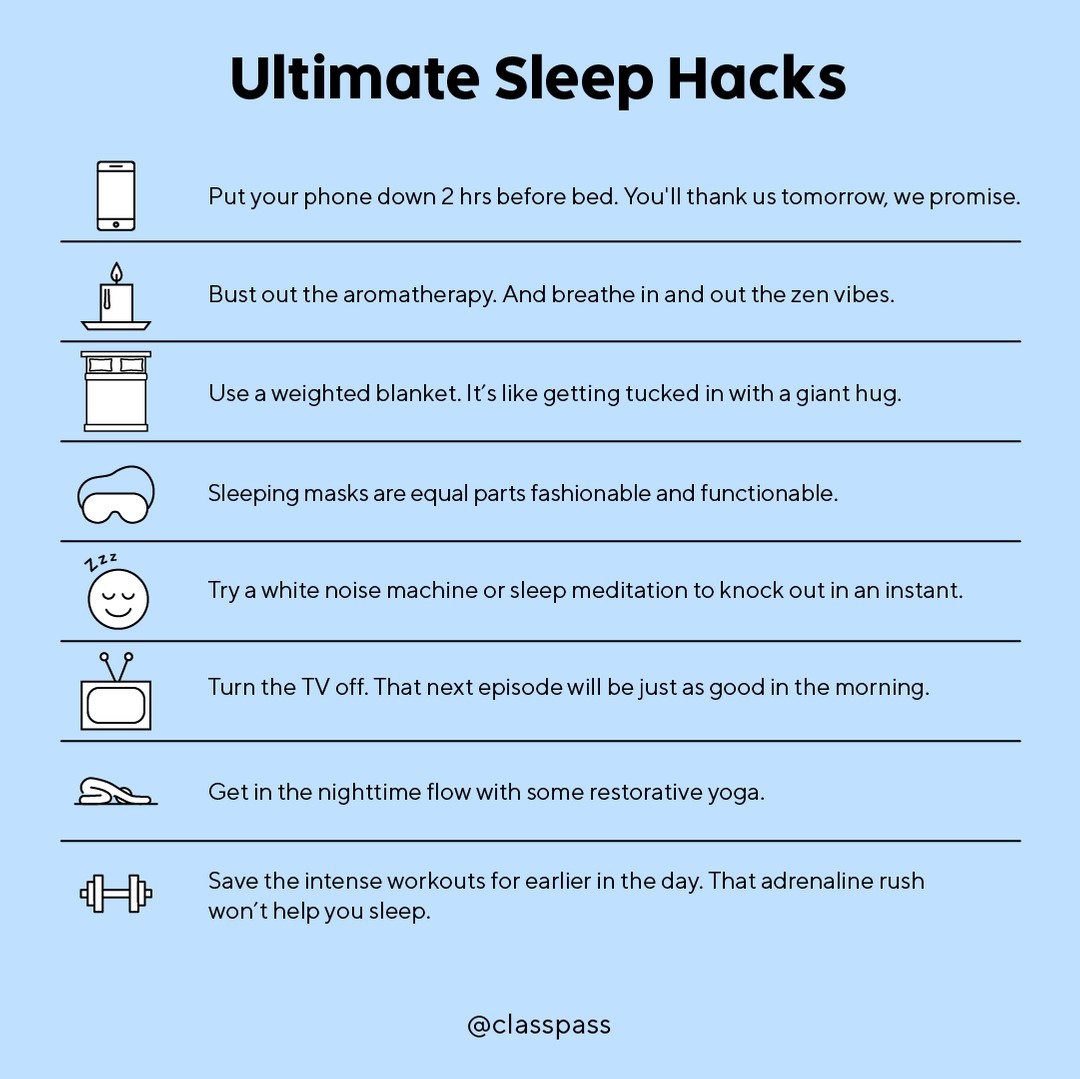
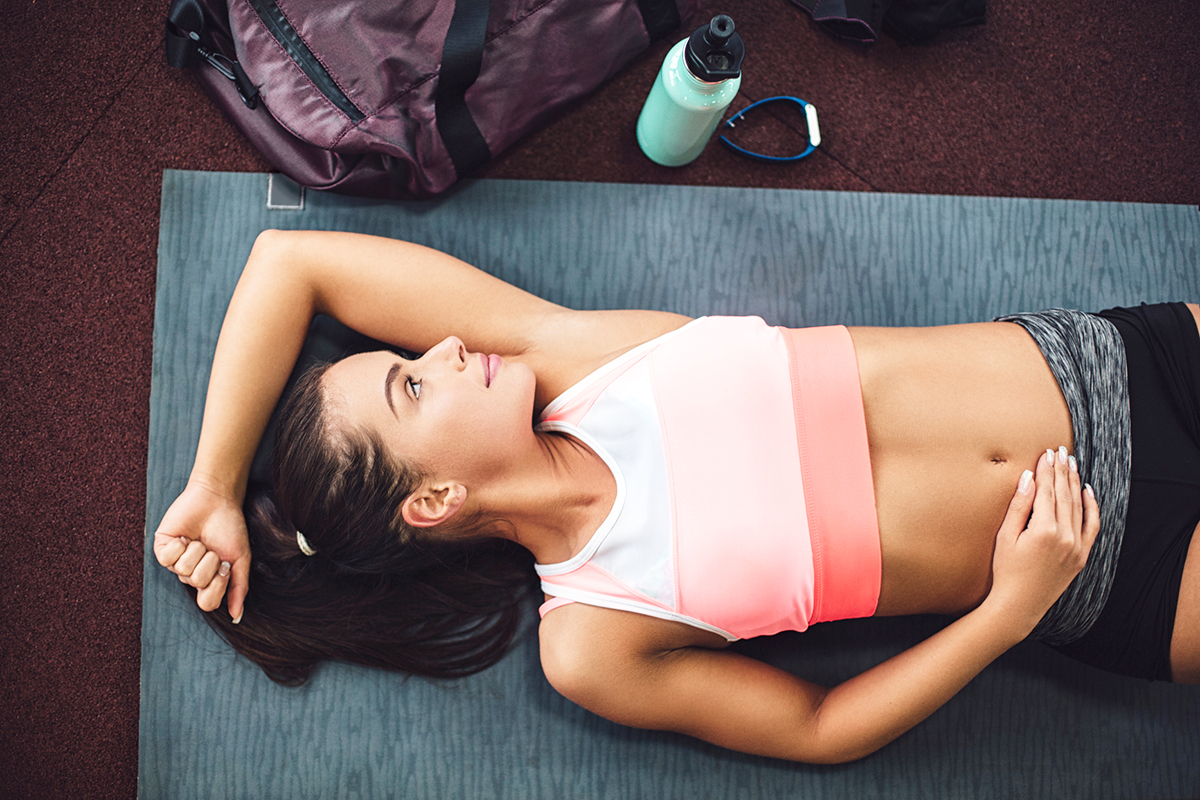
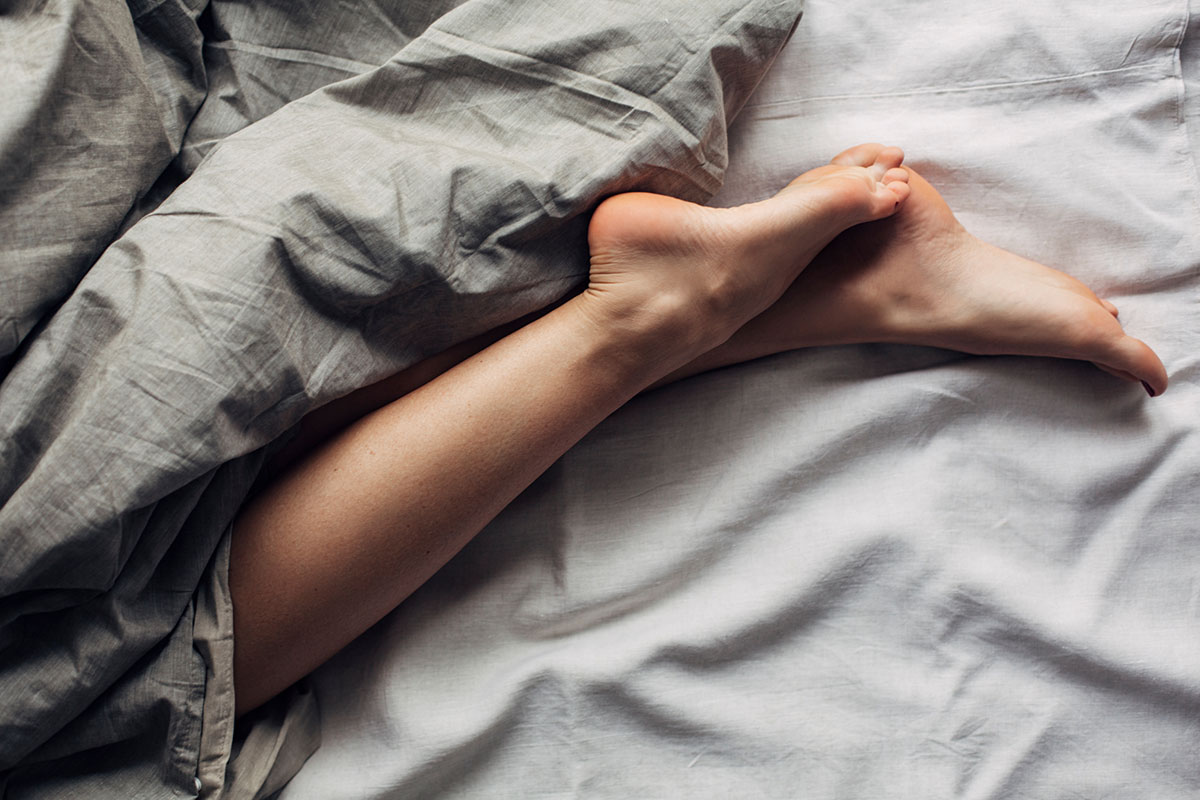
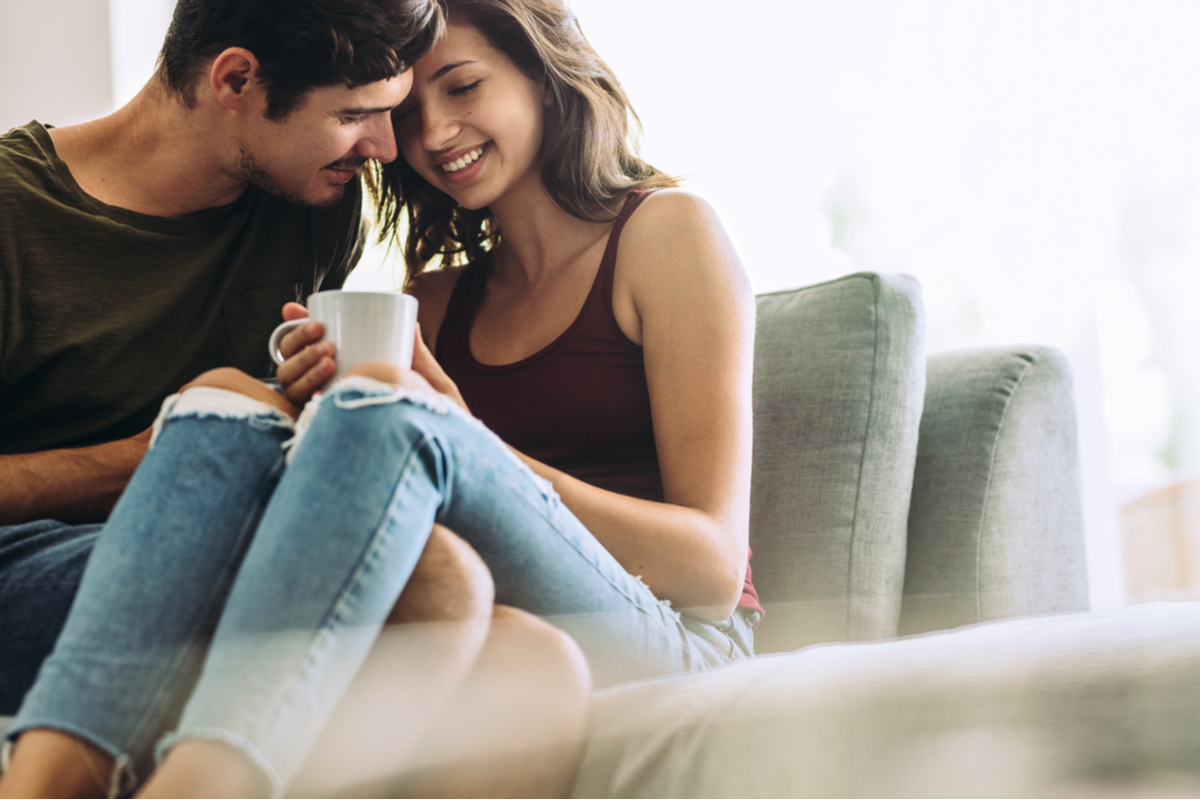
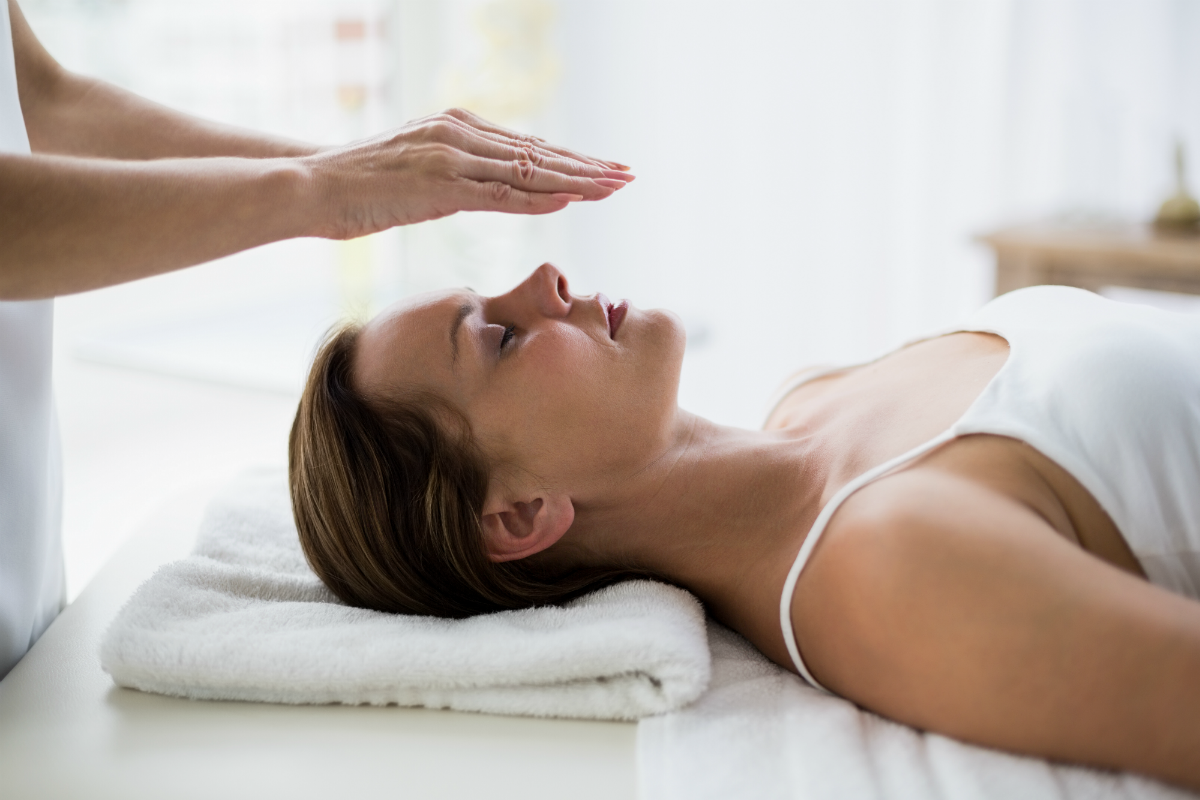
One thought on “The Best Sleep Hacks”